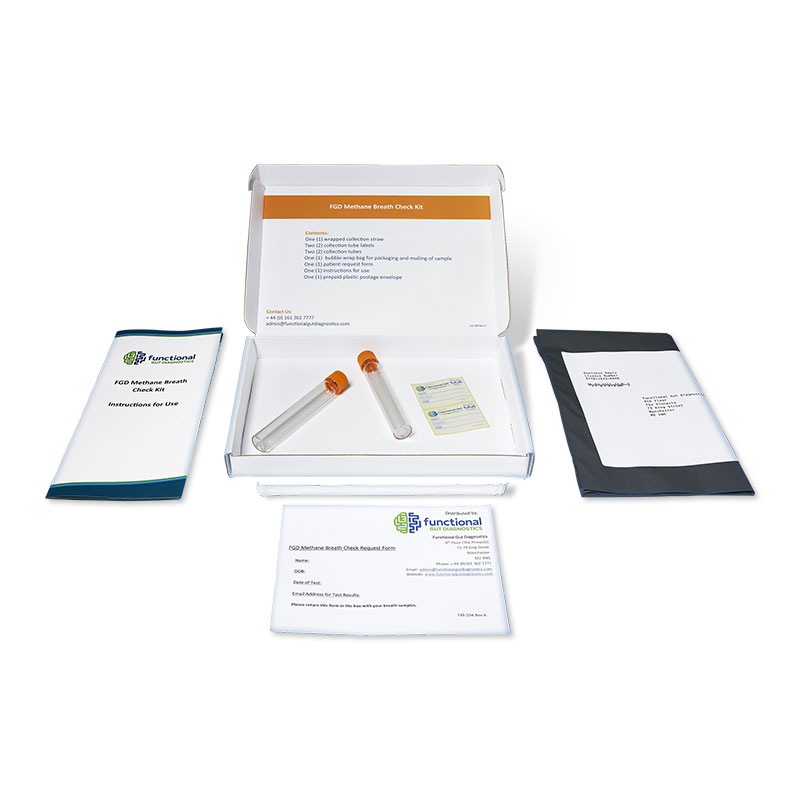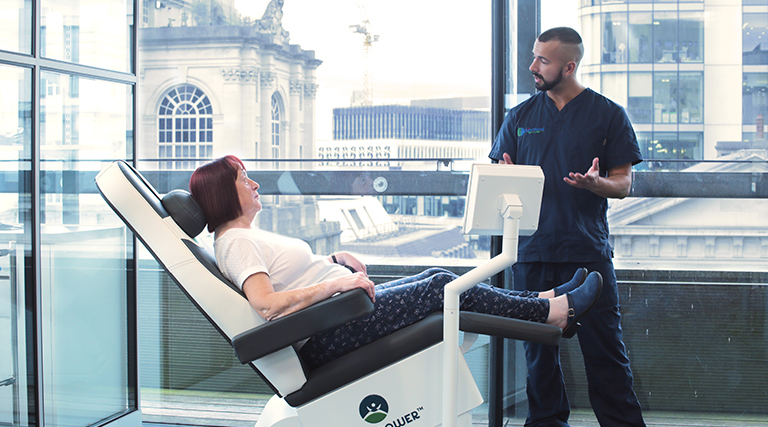By Sarah Bloor, Clinical GI Physiologist
Functional Gut Diagnostics are pleased to announce the launch of a new test – Methane Breath CH4ECK™. Methane Breath CH4ECK™ can quickly and easily detect elevated levels of breath methane in people with symptoms of irritable bowel syndrome (IBS).
There are trillions of microorganisms in our intestines and collectively they make up the gut microbiome. The gut microbiome plays an important role in normal health from digestion to vitamin production and it even regulates the immune system. However, the microbiome can become out of balance when certain types of microorganisms overgrow, especially following the use of antibiotics or a previous gut infection. These microorganisms produce gases that can contribute to gastrointestinal symptoms.
Hydrogen gas is produced by bacteria when they ferment carbohydrates. Methanogens can utilise this hydrogen to produce methane.
Around 1 in 4 of us have methanogens living in our gut, and this usually causes no issues, however in some people, methanogens can overgrow leading to excessive methane production.
Using the Methane Breath CH4ECK™ we can detect if you have an intestinal methanogen overgrowth. This is because methane gas is absorbed through the intestines and into the blood where it is transported to the lungs and exhaled in breath. Elevated breath methane is associated with IBS-like symptoms of bloating, wind and abdominal discomfort, as well as constipation-related disorders, such as constipation-predominant IBS (IBS-C) and functional constipation.1 Higher levels of breath methane are correlated with greater severity of constipation.2
Traditionally, methane is measured in conjunction with hydrogen during a lactulose or glucose breath test. However, this requires lengthy sample collections over a minimum of 2-hours, as well as pre-study preparations, such as stopping bowel medications and following a strict low-fibre diet. Our new Methane Breath CH4ECK™ can be carried out in 2-minutes and requires no preparation except for a 12-hour overnight fast.
Methane Breath CH4ECK™ can accurately detect baseline breath methane levels that would be “methane-positive” on a complete lactulose breath test based on a large consensus of data.3,4 Although, Methane Breath CH4ECK™ does not detect small intestinal bacterial overgrowth (SIBO), it can be used as a simple alternative to a complete and lengthy SIBO test when methanogenic overgrowth is suspected, or if SIBO has already been ruled out with a hydrogen-only breath test. More information about the differences between the SIBO breath test and Methane Breath CH4ECK can be found here.

References
- Kunkel D, Basseri RJ, Makhani MD, Chong K, Chang C, Pimentel M. Methane on breath testing is associated with constipation: a systematic review and meta-analysis. Digestive Diseases and Sciences. 2011; 56: 1612-1618.
- Chatterjee S, Park S, Low K, Kong Y, Pimentel M. The degree of breath methane production in IBS correlates with the severity of constipation. The American journal of gastroenterology. 2007;102:837-841
- Gottlieb K, Le C, Wacher V, Sliman J, Cruz C, Porter T, Carter S: Selection of a cut-off for high- and low-methane producers using a spot-methane breath test: results from a large North American dataset of hydrogen, methane and carbon dioxide measurements in breath. Gastroenterol Rep (Oxf). 2017, 5:193-199. 10.1093/gastro/gow048
- Rezaie A, Chang B, Chua KS, Lin E, Pimentel M: Accurate identification of excessive methane gas producers by a single fasting measurement of exhaled methane: a large-scale database analysis. Am J Gastroenterol. 2015, 110:759-760.
- Pimentel M, Saad R, Long M, Rao. ACG Clinical Guideline: Small Intestinal Bacterial Overgrowth, The American Journal of Gastroenterology. 2020, Volume 115 – Issue 2 – p 165-178

